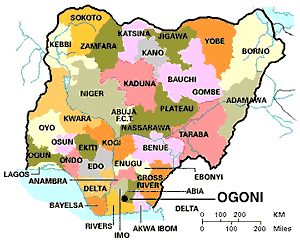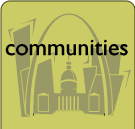| home | our mission | contact us | issue archive |

Jul 2001 / communities :: email this story to a friend

No Silence in Asylum
By Kent D. ShawNoble Obani is somewhat reticent as we share lunch at South City Diner. I can understand. I just asked him how he escaped from his homeland in Nigeria. This wasn't one of those polite questions, like, "So where did your plane take off?" or, "How did you find political asylum?" Those were the easy questions I had already asked. Noble had found his way to the Benin Republic, and from there the United Nations told him his next home would be St. Louis, in the United States.
No, the question I asked made Noble think but not tell. I wanted to know, pointing at a map of Nigeria, "how you made it from here to here," over 150 miles of Nigerian delta.

Noble was running, meaning that he was running from the government. His friend and leader Ken Saro-Wiwa had been killed on charges of plotting to kill the Ogoni tribal chieftains. And now Noble would join the growing number of Ogoni people who have found political asylum all over the world.
The Ogoni people are one of many tribes located in the Nigerian delta. In 1958, they were introduced to the world community when Shell Oil discovered rich deposits on their land. Shell quickly coordinated with the government to obtain drilling rights.
A company pumping crude oil is not committing a crime. Having grown up in Oklahoma, I'm used to seeing oilrigs in front of strip malls, yards away from an elementary school or church. There was even an oil well across from the entrance to the capitol building in Oklahoma City. For the Ogoni people, the problem comes from the government colluding with the oil companies and refusing to respect the land they are drilling. Shell Oil, which pumps 60% of all oil coming out of Nigeria, is responsible for spilling thousands of barrels of crude oil each year. Understandably, the Ogoni people complain to their government. The government's response is to arrest and kill the people who ask questions or make demands.
Oil is big business in Nigeria. It provides four-fifths of all revenue to the government. Nigeria produces more oil each year than any other country in Africa. Yet the government does not provide infrastructure to those parts of the country where the oil is produced. The Ogoni people don't have electricity. They don't have running water. They don't have roads. According to the Movement for the Survival of the Ogoni People (MOSOP), the oil pumped on the Ogoni homeland has made $30 billion for the government over the past 40 years. Yet there has been no effort to provide the Ogoni people with the same conveniences enjoyed in the northern parts of the country.
Shell Oil Nigeria boasts that 90% of its workers are natives of Nigeria. This is misleading. Noble tells me that most of the politicians come from the north, and most of the people that Shell Oil employs also come from the north. Unfortunately, none of the oil is being pumped from the northern states, so they feel no vested interest in keeping the drilling facilities clean. What makes things worst, the Ogoni people have no representation in the government to demand better conditions.
Since arriving in St. Louis, Noble has continued to work against the Nigerian government and Shell Oil. He and other Ogoni exiles living in Denmark, Ireland, London, and New York City have sought to raise people's awareness of the problem. He says, "St. Louis is a good place to work from because it is central between the two coasts. It is easy to coordinate meetings with those from all over the US." Last year, he hosted a three-day conference in Forest Park. People attended from all over the world.
There are two very specific things people can do to protest the wrongful treatment of the Ogoni people. One is to boycott Shell stations, and the other is to put pressure on the US State Department to force fair treatment of the Ogoni people. Some people might think that their choice of gas stations cannot affect the oil production in a country halfway around the world. Shell argues that a consumer not choosing Shell gas only hurts the small franchise owners. In fact, Noble says that many of those franchise owners have written to Shell, telling them of the problems they're having. The boycott is having a positive effect and must be continued.
Noble is only quiet when it comes to personal questions. I ask him what places in St. Louis he likes best and he says the Arch, the Zoo, the Science Center. He elaborates little. Perhaps I even sense a slight impatience. But he is not from St. Louis, he is from the River state of Nigeria. Noble is a political refugee whose only impatience is directed toward an oil company and a government, and neither one will listen. And so he waits while the eye of justice watches from over his shoulder.
(For more information on MOSOP, there is an excellent site based in Canada: www.mosopcanada.org.)
Kent D. Shaw is a poet and writer in St. Louis.
Church and State | Games | Expatriates | Communities | From the Source
It's All Happening | Young Minds | The Ordinary Eye | Elsewhere
Sights and Sounds | Media Shoegaze | A Day's Work | From the Editor
© 2001 The Commonspace
